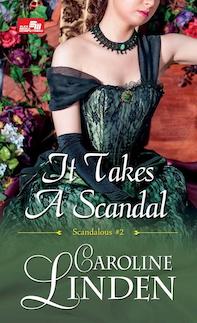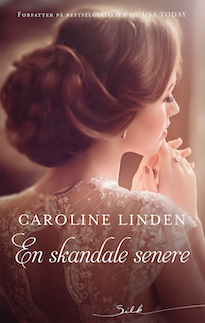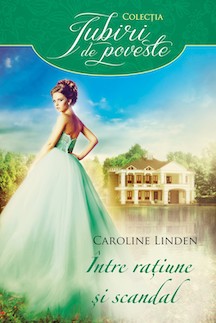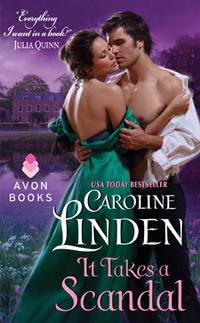 1816
1816
He came awake with a start, heart racing. The French were upon him—the tirailleurs leaping over the barricades, their long muskets gleaming in the hazy light as they tried to sweep his brigade from their position. His ears rang, deafened by the first shot that had shattered his knee. For a moment he struggled to breathe, waiting for the second shot that would end it all.
The deafness persisted; no second shot came. Belatedly he realized there had been no first shot—not tonight. He was not on the battlefield in Belgium, trying desperately to beat back the Emperor's troops from a sunken lane. He was home in England, sleeping in a chair by the dying fire with his ruined leg splinted in front of him.
Sebastian Vane slumped back into the worn leather, exhausted, as his heart still beat a frantic tattoo against his breastbone. With a trembling hand he wiped the cold sweat from his face. There were no French here, only laudanum nightmares of them.
A soft bang made him start again. He looked toward the door, but it was closed. Another door had slammed, downstairs from the sound of it.
The housekeeper must be up and about. Mrs. Jones was running herself ragged nursing her husband, who'd been sick in bed for the last week, as well as caring for a madman and a cripple. The poor woman. Sebastian groped for his watch; it was late, after midnight. He'd been asleep for two hours, and now felt as though he wouldn't sleep again tonight, which was a shame.
It had been a relatively good night thus far. His father's madness seemed to have receded a bit, leaving him more like the parent Sebastian remembered and less like the deranged lunatic he'd found on his return from the war. Michael Vane had eaten a few bites of his dinner tonight before hurling the platter aside and muttering about poison. When Sebastian helped him out of his clothes, he hadn't kicked, only cursed. And when Sebastian put him to bed, his father had gone as docilely as a child, wrapping his hand around the ragged strip of fabric that had once been Sebastian's mother's nightgown. That nightgown had been a godsend; with it in his grasp, Michael grew calmer and more manageable.
Well. That wasn't really the father Sebastian remembered—calm and docile, soothed by a worn-out nightgown—but it was a far sight better than the screaming madman he often was. Sebastian shifted his weight, trying to stretch his leg without reopening the wound. His father had kicked him the previous day, splitting open the scar over his knee and leaving him so faint with pain, Mrs. Jones had run for the laudanum. Nasty stuff, laudanum. He'd almost weaned himself off it, before the kick, and hated that he had to take it again.
The wind howled past the windows, rattling the panes of glass, and the door below banged again, harder. He raised his head and frowned. That sounded like the heavy front door. "Mrs. Jones," he called. Perhaps she'd had to step out and failed to latch it on her return to the house. There was no reply from below, only a slightly softer thud from the door. Mrs. Jones must have gone to bed, and she wouldn't be able to hear it from her rooms behind the kitchen.
He sighed. He could ring the bell and wake her, but he wasn't going to sleep anytime soon. Didn't he want to be independent again? Gingerly he eased himself forward in the chair, setting his left foot on the floor. With a hard shove he was on his feet, unsteady until he got his crutch set.
The corridor was dark, only a faint light bleeding up the stairs. As he reached the head of the stairs, there was another great thump from below, with a gust of cold air. Alternating between cursing and holding his breath, he hobbled down the stairs to see the front door, unbarred and unlatched, swing slowly open as the wind caught it.
Puzzled, Sebastian propped his shoulder against the door frame and caught the door as it blew toward him again. The heavy bar that should have held it closed lay across the threshold, preventing the door from slamming closed. Normally it fit across the jambs, to prevent the door being opened from the outside. It was as if someone had removed the bar and simply dropped it.
 The back of his neck prickled. Only one person in the house would do that … but Michael Vane was securely locked in his room upstairs. Sebastian did it himself, every night, for his father's own good.
The back of his neck prickled. Only one person in the house would do that … but Michael Vane was securely locked in his room upstairs. Sebastian did it himself, every night, for his father's own good.
Still, he pushed the door open and peered out. The moon was a thin crescent, and the cold wind whipped the shrubbery and trees into frenzied waving. But the sky was clear of clouds, and there was enough light to see that the grounds were deserted. He shook his head; it must have been the housekeeper, who was no doubt exhausted to the point of delirium. He closed the door and dropped the bar into place before limping up the stairs to his room again.
He had barely settled into his chair, though, when there was another thumping from below. This time it wasn't the door itself, but someone pounding on the door. "Vane!" cried a familiar voice over the moaning wind. "Damn you, Vane, wake up!"
The pounding continued as Sebastian made his way back down the stairs, cursing all the while this time as his knee burned. He wrestled the bar up and away, whereupon the visitor threw open the door and surged over the threshold.
"Where is she?" demanded Benedict Lennox. "So help me, Vane, if you've touched her—"
"Who?"
"Samantha," spat Benedict.
Sebastian's eyebrows shot up. "Why would your sister be here, at this time of night? She's only sixteen—"
"Which is probably why she's gone and done such an idiotic thing!" Benedict lowered his voice. "If you just produce her now, I'll take her home with no questions or arguments. No one else knows she's missing yet—"
Sebastian's mouth thinned. "She's not here."
Benedict glared at him. "No? She told me she's in love with you, and has been for years."
"Schoolgirl infatuation," Sebastian said in a low voice.
"But a headstrong, impulsive schoolgirl could easily be persuaded to throw her lot in with a—"
He stopped abruptly, but Sebastian could fill in the rest: a madman's son, crippled and destitute. "How flattering," he said evenly. "I never guessed my personal charms would be strong enough to persuade an earl's daughter to throw herself away on me, bankrupt and lame though I am."
Benedict's eyes flashed with fury. "You know she would elope with you if you asked," he snarled.
"But I didn't," Sebastian pointed out. It made no difference. Benedict had already headed down the corridor, opening each door he passed. Sebastian stood listening to the search in impotent humiliation. He knew Samantha had once fancied herself in love with him, but it was calf love. Even if it wasn't, she had to know that her father, the Earl of Stratford, would never allow her to marry the son of Mad Michael Vane. Everyone knew it. And it had made Samantha's infatuation, once something amusing and flattering, into yet another source of mortification as her family made certain everyone knew such a match was utterly unthinkable.
And now Samantha's brother, who had once been his dearest friend in all the world, thought he'd schemed to elope with her. Sebastian limped to the bottom of the stairs and rested against the newel post. Benedict was making a very thorough effort; he knew the house well. He'd practically lived here as a boy, fleeing the strict air at Stratford Court for the woods and hills of Montrose Hill. One upon a time, Benedict's arrival in the middle of the night would have filled Sebastian with elation and excitement, and the two of them would have stolen off into the woods for a night of illicit adventure.
 But that had been a very long time ago.
But that had been a very long time ago.
Benedict came back to the hall, his expression grimmer than ever. "I'm going upstairs."
"I can hardly stop you," Sebastian said under his breath. Benedict was already headed up the stairs, and this time he followed.
As expected, Benedict took more care up here. He opened the door at the top of the stairs, pausing when he saw the bottle of laudanum on the mantel. He gave Sebastian a wary glance, seeming for the first time to take in his splinted leg, his crutch, the dressing gown he wore. "You could help me look," he said in a somewhat calmer tone.
"She's not here." Sebastian leaned on his crutch, still winded from going up and down the stairs so many times. "Whether I look or not, you won't find her."
Benedict set his jaw, and continued to the next door. He made his way quickly down the corridor; all those rooms were empty, even the linen cupboard. Everything in them had been sold. Only at the far end of the corridor did Sebastian stop him.
"That's my father's room," he said as Benedict reached for the knob. "It's locked."
But it wasn't. The door opened an inch under Benedict's hand.
His former friend looked at him. Sebastian stared at the door in shock. He'd disabled the lock on the inside of the door himself. He stumped closer, clumsy in his haste, and reached up. The key hung in its usual spot on the wall, next to the door in case of fire. He was sure—certain—he'd locked it just a few hours ago. And yet the door opened, creaking softly as Benedict pushed it open.
It was as dark as pitch in the room. No fire or lamp of any kind was allowed, not since Michael Vane had tried to set himself ablaze. Sebastian hobbled to the window and threw open one of the shutters. Benedict made a noise of quiet shock at the sight of the bars crossing the windows, too closely to allow even a hand through them, but Sebastian was staring at the bed.
The empty bed.
He grabbed Benedict's coat. "Why are you here?"
"To—to find my sister." Benedict seemed rattled as well.
"Why the devil did you think she was here?" he demanded.
Benedict stared at him. "Because she said nothing would stop her from marrying you."
Sebastian cursed again. "If her father wouldn't—and I strongly assume he would—I would." He thumped his crutch in illustration. "But why did you think she was here tonight?"
"I— She went missing," said Benedict, finally appearing to grasp how thin his logic had been. "I couldn't find her …"
"She's not here—she never has been." Sebastian limped from the room, the crutch digging into his arm. "And now, neither is my father." His brain still felt a bit fuzzy from the laudanum; damn it, he must have forgotten to lock the door. How long had it been since Michael escaped? Between the cold and the darkness, time was of the essence in finding him.
He turned back toward the stairs. Behind him he could hear Benedict opening the last few doors, all of which led into rooms that were completely empty. Benedict caught up to him in the hall below, as Sebastian was putting on his hat and coat. "Where else could she be?" he asked, only slightly subdued.
 "I've no idea. She's your sister." Sebastian pulled open the front door and gestured. "Go home, Ben. She probably went to the library for a book, or to the kitchen for some warm milk."
"I've no idea. She's your sister." Sebastian pulled open the front door and gestured. "Go home, Ben. She probably went to the library for a book, or to the kitchen for some warm milk."
Benedict scowled, although with real worry this time. "I looked there. I looked everywhere. She was gone, I tell you. And you—and she—"
Sebastian shrugged. He was fond of Samantha … as a brother or a cousin might be. With her promise of beauty and her father's position and wealth, she would marry much better than he, a crippled soldier whose father had laid waste to his estate because he thought the devil was after him. Sebastian himself had told Samantha that he wouldn't be a good husband; he'd only meant to let her know, gently, that her affection for him was misplaced. He was needed at home to care for his father, and now he'd been proven negligent even at that.
"Why were the windows upstairs barred?"
Sebastian raised his eyebrows at the hesitant question. "Because he's gone mad—hadn't you heard? He's a danger to himself and must be locked in every night."
Benedict glanced up the stairs. "But the door was unlocked. Perhaps Samantha …"
"Crossed the river, in the dark, climbed the hill, found a way into the house, unlocked his door, and then left, without anyone seeing her?" Sebastian finished when Benedict didn't. "How likely is that? And what would it gain her, in any event?" He shook his head, fumbling with his buttons, cursing the laudanum that made him clumsy—and forgetful—tonight.
"No," murmured Benedict. "I know that even if she thought … That is to say, there would still be …" He flushed, stopping short of saying what they both knew.
"Even if he died, it wouldn't change anything?" Sebastian gave him a hard look. "I suggest you go home to find your sister."
Benedict hesitated, then jerked his head in a single nod. He went out and untied his horse from the post. With a quick, easy motion that gave Sebastian a pang of useless envy, he swung into the saddle and wheeled his horse around. "Good luck," he said after a moment's pause.
Sebastian nodded once. "And to you."
Benedict disappeared into the night. It would take him close to an hour to get home on horseback. He would have to ride through Richmond and rouse the ferryman, although perhaps he'd paid the man to wait when he came across the river the first time. He'd be cold and stiff by the time he reached home—which must say something about how strongly he feared his sister had been persuaded to run off with Sebastian. Just another bit of proof that their friendship was irrevocably over.
Sebastian glanced longingly toward his dark and empty stables, wishing he, too, had a horse. It would make searching for his father much easier, if he had to go into the woods. Of course, he couldn't ride anywhere. Thanks to his ruined knee, mounting a horse would be agony, and thanks to his father's delusions, they didn't have any horses anyway. He went to rouse the Joneses, unable to answer their alarmed queries about how Mr. Vane had got out. When a quick search of the house and stable revealed nothing, he struck out for the woods.
 As he limped down the uneven path, the echo of his own words followed him. Even if he died, it wouldn't change anything. That wasn't quite true. If his father died, he wouldn't have to sleep in his chair, ready to spring into action if another fit seized Michael. He wouldn't suffer any more injuries trying to keep his father from harming other people. He wouldn't have to watch his once intelligent, practical parent become a distorted shell of himself, filthy and insane and raving about the demons pursuing him. In many ways, Sebastian knew it would be a mercy when death finally claimed his father.
As he limped down the uneven path, the echo of his own words followed him. Even if he died, it wouldn't change anything. That wasn't quite true. If his father died, he wouldn't have to sleep in his chair, ready to spring into action if another fit seized Michael. He wouldn't suffer any more injuries trying to keep his father from harming other people. He wouldn't have to watch his once intelligent, practical parent become a distorted shell of himself, filthy and insane and raving about the demons pursuing him. In many ways, Sebastian knew it would be a mercy when death finally claimed his father.
But it wouldn't make him any more eligible. Samantha had to know that as well as anyone. Benedict would find her safe at home, and feel like an idiot for rushing to Montrose Hill. For a moment Sebastian wondered if his onetime friend would apologize for his accusations, and then he shrugged it off. The odds were highly against it, and if not for Benedict's visit, he wouldn't have known his father was missing until morning. Perhaps he should thank Benedict for being so suspicious. He raised his lantern higher and tried to think where his father might have gone.
At dawn, Mr. Jones found Sebastian and half carried him back to the house for a few hours of sleep. Together he and Mr. Jones combed the meadow and dragged the pond, an exercise which put Mr. Jones back into bed with chills and a cough.
Two letters arrived that day. One was from Benedict, apologizing for troubling him. Samantha had indeed been safe at home. The other letter was from Samantha herself, urging Sebastian to call on her. He supposed Benedict had told her what happened, and she also wanted to apologize. He hoped that was all she wanted to say; the sooner she redirected her affections, the better for all of them. Sebastian threw both notes on the fire.
But no trace of Michael Vane was ever seen again. And instead of making anything better, his father's disappearance only made everything much, much worse.
 1822
1822
Richmond-on-Thames
"Well, my dear, what do you think?"
Thomas Weston stood in the center of the main hall at Hart House and spread his arms wide, beaming.
"What's wrong with a house in London?" his wife asked, casting a dark look on the dust motes floating in the sunlight that streamed through the open door and tall flanking windows. The estate agent who had brought them to view the house waited discreetly outside.
"London is London. A country estate is what sets a man apart and makes him a gentleman."
"It's also what squanders his fortune and incites him to spend ever more, redecorating and building and entertaining." His wife tipped back her head. "That plaster is already cracked. You'll be a pauper within the year, fixing every little thing around this house."
"A bit of cracked plaster," he scoffed. "The house is sound, Mrs. Weston! It's within a day's drive of town, so you can go back and forth if it pleases you. You'll never be apart from your dressmakers and bonnet shops and all those furbelows you don't seem to mind spending my fortune on."
"A new bonnet is nothing to the cost of a new house," she replied tartly. "To say nothing of landscaping and furnishings and staff."
He put his hands on his hips and sighed. "But think of the parties you can throw here, in the finest gowns from Bond Street," he cajoled. "Mrs. Weston of Hart House! It will be the most coveted invitation in all of Richmond, I've no doubt. And think of the girls—picture our daughters gliding down these stairs, also in splendid new gowns, dancing with the gentlemen of the neighborhood, forming friendships with the daughters of the nobility." He put his arm around her and drew her into the very center of the hall. "Imagine it: you and I, standing right here, welcoming our genteel and noble guests. My lord, my lady." He made an extravagant bow to an imaginary couple. "What an honor to have you grace our humble home. May I present my wife?" He swept her hand up to kiss it, giving her a sideways, hopeful glance. Mrs. Weston pursed up her lips, obviously trying not to smile. Encouraged, he went on. "Why, yes, my lord, she is the most beautiful lady in all of Surrey, and the most gracious hostess. Indeed, my lady, her gown is the very latest fashion; I'm sure she would be delighted to commend you to her dressmaker." Mrs. Weston rolled her eyes at her husband's antics.
From the top of the curving staircase overlooking them, Penelope Weston leaned closer to her sister. They were watching their parents' little drama from there, after exploring the upper rooms. "He's laying it on a bit strong, isn't he?"
"Just wait," murmured Abigail in reply. "You know what's coming …"
As if he could hear her, her father clapped one hand to his heart. "And you must meet my daughters! Two lovelier, sweeter girls you've never met, and every bit as beautiful as their mother. What's that? You have an unmarried son and heir? A gentleman in search of a bride? A bride whose family is refined and respectable, with property in London and Richmond?"
"There it is," said Abigail with a wry smile. Penelope gave a quiet snort.
"Stop, Thomas!" Mrs. Weston finally burst out laughing and swatted his shoulder. "You're too ridiculous—as if buying this house will guarantee a match for one—or both!—of our girls!"
"Well, it can't hurt, can it?" He gave her a winning smile. "Come, Clara; what say you? It's a fine house, isn't it?"
"Yes, it's very fine," she agreed. "Exceedingly fine! It must cost the earth, and how much time do you expect to spend out here in the wilds?"
"Wilds!" He threw up one hand. "It's less than ten miles from London."
 "We're settled in town," she went on. "We're comfortable. You're ignoring how disrupting it will be to pack up and move house, even a mere ten miles."
"We're settled in town," she went on. "We're comfortable. You're ignoring how disrupting it will be to pack up and move house, even a mere ten miles."
"But once we're settled here, it will seem a mere trifle. We can journey by river. I shall buy you a barge with ten Egyptians to sail you back and forth, like a modern Cleopatra." He sidled closer. "What will convince you, my love?"
She gave him a stern look. "We both know you aren't really asking my approval. I expect you've already bought it, haven't you?"
"But I still want you to be pleased," he answered, not bothering to deny it.
Upstairs, Abigail stifled a laugh. How like her father. So this would be their country house. She looked around it with new consideration. It really was a lovely building. Mama would come around once it was time to choose carpets and furnishings, if by some chance Papa didn't manage to win her over sooner. He usually did, though.
"I'm going to go choose my room now," whispered Penelope. "As far away from Mama's as possible." She disappeared toward the bedchambers.
Abigail went down the stairs and walked past her parents, her mother still pretending outraged disapproval and her father still cajoling her, and out onto the gravel drive. The house itself wasn't enormous, but it was well proportioned and handsome. The landscape was peaceful and beautiful, and the air was certainly clearer here than in town. Yes, Mama would come around. Within a year, she'd probably prefer it to their house in Grosvenor Square.
Her brother, James, came around the side of the house. He'd probably been off inspecting the stables. "What do you think, Abby?"
"Papa's already bought it."
He nodded, squinting in the sunlight. "I know."
"What?" she exclaimed. "He told you, but not Mama?"
A faint smile touched his mouth. "If he bought it before he showed it to her, she couldn't argue him out of it, could she?"
"That's cheating!"
James laughed. "All's fair in love, I suppose. Father's had his heart set on a country property for some time now, and this is a good one; the house is sound, only in need of decoration and a few minor modernizations. The prospect is ideal, as Mama will agree when she can plan picnics and boating trips. And the price was reasonable."
 Abigail shook her head. "He's in there now, telling her Pen and I are likely to meet titled gentlemen because of this house."
Abigail shook her head. "He's in there now, telling her Pen and I are likely to meet titled gentlemen because of this house."
"I shouldn't doubt it. The Earl of Stratford's seat is nearby, and there are dozens of villas and small estates where the nobility come for the fresh air."
"The Earl of Stratford!" Abigail snorted. "Now you're as fanciful as Papa."
"I never said any of them would marry you," he pointed out. "Just that you're likely to meet them—fat, gouty, senile, or lecherous though they may be. Besides, Lord Stratford is Papa's age, and already married. He's got a son, but I believe he's away in the army. You and Pen are out of luck there; perhaps the Marquess of Dorre, who owns Penton Lodge near Kew, will bring his sons. Although I hear rumors the middle one is someone to avoid."
"How do you know all that?"
He shrugged. "I pay attention. Don't you?"
Abigail bit her lip. She did pay attention to gossip about gentlemen, titled or otherwise. Still, even she hadn't known about Dorre's middle son; what had he done, that people ought to avoid him? "Perhaps you'll meet a young lady now that we have a country property. In fact, since the house will be yours one day, it's far more likely to snare you a bride."
Her brother's lips twitched. "Don't you know I'm hopeless? Penelope told me so herself."
"No, she said you were dull and unimaginative, and no one wants to marry a dull man." Abigail grinned. "I myself find it far more likely that you'll marry an aristocratic girl than that some viscount or earl will appear out of nowhere to call on me or Pen."
"Don't wager your pin money on it," he said shortly.
She laughed. "Believe me, I won't. Haven't I learned after all these years that you usually beat me?" Together they walked through a covered walkway to a very pleasant lawn overlooking the river. The house was set on the head of a gently rolling slope toward the river, and one could probably go punting right into the heart of London from here. Even if Mama didn't come to like it here, Abigail thought she very well might.
Still, her father's reasoning was somewhat daft. "They must know it's not terribly likely for any of us," she murmured. Her brother shot her an unreadable glance. Abigail flipped one hand. "Aristocratic husbands—or wife. Everyone looks down on us as nouveau riche tradesmen."
"Noblemen," said James, staring down at the sparkling river, "have married actresses. Mistresses. Americans. Some lord somewhere has probably married a scullery maid. Believing a pretty girl with a handsome dowry could catch one isn't too much of a stretch. They don't put up much of a fight, when enough money is involved."
"Could catch one," she repeated, laying heavy emphasis on the first word. "Not necessarily will catch one. And what if I don't like any that might deign to take me? Mama chose a humble attorney's son, and she seems happy enough. Perhaps I'm destined to be a butcher's wife."
"Your friend's marriage raised her hopes." He gave her a sideways glance. "To say nothing of Father's hopes."
Abigail grimaced. Her dear friend Joan Bennet, who had been every bit as ignored by the gentlemen of London as Abigail and Penelope, had recently married one of the most eligible, and elusive, men in London, Viscount Burke. It certainly had caught everyone by surprise—even including Joan, if she could be believed. But Mr. and Mrs. Weston had indeed been very pleased by the news. "You'll recall that began inauspiciously," she reminded her brother. "She hated him at first, and he tormented her."
"He tormented her?" James raised his eyebrows. "I recall horrid tales of him dancing with her, and even a cruel report that he took her ballooning. Dear sister, if any eligible, wealthy viscount torments you so, do let me know at once. I'll rush straight to the betting books and wager my entire fortune that you'll be married to the fellow before the end of the year."
 "Stop it." She scowled at him. "Obviously he stopped tormenting her. But even so, Joan's father is a baronet; her uncle is the Earl of Doncaster. She has connections, and we don't."
"Stop it." She scowled at him. "Obviously he stopped tormenting her. But even so, Joan's father is a baronet; her uncle is the Earl of Doncaster. She has connections, and we don't."
"Take heart, Abby." He gave her one of his rare, sly grins. "I'm sure the butcher will treasure you with all his heart."
"He'd better," she retorted, before giving in to the urge to laugh. Her brother joined in a moment later.
"What's so funny?" Penelope joined them, looking a little grim. "Jamie, did you know Papa already bought this house?"
"Yes."
She made a face at him. "And you didn't tell us! You're utterly worthless as a source of gossip."
"Being able to hold my tongue is a useful skill. You might try it some time."
Penelope huffed. "Where would be the pleasure in that?" She faced Abigail. "There is one absolute failing of this house, and I'm sure you know what it is."
"Ah …" Abigail darted a look at her brother, who shrugged.
"You know," repeated Penelope meaningfully. "We're all the way out here in Richmond, away from the shops of London."
"There are shops here as well, you know," said her brother.
"Not the right shops," she replied without looking at him. She seemed to be trying to bore a hole in Abigail with her bright blue gaze. "How shall we ever get the right lotion, and rouge, and hair pomade? We'll look like Druids camping out on the moors."
"Buy plenty in London and bring it with you," suggested James. "A little planning will solve nearly every problem."
Penelope gritted her teeth, still staring fiercely at Abigail. "But we may run out. And what if I put on weight, with so many fewer balls to attend? I shall need a new corset—perhaps one of those with the extra gussets under the bosoms, you know, the sort that hold each side separately—"
"I regret underestimating your suffering," said James hastily. "You'd best ask Mama's advice." He was already edging away, and disappeared into the house in a minute.
"Poor Jamie," said Abigail in amusement. "How will he ever marry, when the mere mention of a corset makes him turn green?"
"How will he ever marry, when the only things he talks about are horses and money?" Penelope flicked one hand, dismissing their brother. "You know what I meant, don't you?"
"I believe so." Abigail turned and strolled a little farther from the house. Who knew when her parents might come out to see the view? Her mother seemed possessed of supernatural hearing at times, and unlike her sister, Abigail had the common sense not to test it.
Penelope followed her. "How are we to get new issues of 50 Ways to Sin all the way out here? It took weeks to discover the bookseller in Madox Street. For all we know, no one will be selling it in Richmond."
"Perhaps we ought not to look for it at all." Abigail gave her a stern look. "You're still in Mama's black books over that, you know. Querying every broadsheet seller in Richmond will make it worse."
Fifty Ways to Sin was the most notorious pamphlet in all of London. Each issue recounted one of the author's amorous encounters with prominent gentlemen, in lush and explicit detail. The author, calling herself Lady Constance, concealed her lovers' names, but wrote of them in such terms that made everyone desperate to unmask the gentlemen involved. The true identities of the men, to say nothing of Lady Constance herself, were hotly debated by most of London, and the pamphlets were highly coveted. The erotic nature of the stories meant they had to be sold rather discreetly; one had to know which booksellers to ask, and since the pamphlets were published irregularly, one had to ask at the right moment, or they would be all sold out. No one was a more avid fan than Penelope, although Abigail was nearly as engrossed.
Together with their friend Joan—now the Viscountess Burke—they had analyzed every issue in great detail. Fifty Ways to Sin had provided a remarkable education on topics normally forbidden to young ladies. The lure of that forbidden fruit had been Penelope's downfall, though. In her eagerness to read one issue, she'd been caught by their mother, and was now under strict watch. So far Abigail had escaped that scrutiny, and she meant to keep it that way.
Her sister's face wrinkled up in frustration. "I know! Oh, blast and damn. Why did you have to give all our copies to Joan?" When their friend had recently married, with a whiff of hushed-up scandal, the Weston sisters had agreed she needed them more, and they gave her all the copies they could find. With a husband of her own, Joan might actually be able to test some of the more incredible acts described, and—presuming she was a very good friend indeed—report back on the truth of them. The only trouble was, her new husband had taken her off to his family estate in the country, and the issues had gone with her. Or so Abigail supposed; if she had a handsome husband, she would be sure to take every issue with her, for helpful suggestion and instruction.
 "You agreed," Abigail reminded her sister.
"You agreed," Abigail reminded her sister.
"I know!" Penelope put her hands on her temples. "I thought there would be a new issue, or three or four, by now. How could it be a month without even one?"
"Perhaps Lady Constance retired to the country for the summer as well."
"Don't say that!" Penelope kicked at the ground, sending a stray pebble bounding into the grass. "Papa's already decided we shall have a ball. He intends to impress everyone in Richmond right from the start."
"Already?" Abigail felt a stirring of interest. "We haven't even taken possession of the house. When does he propose to have it?"
"In a fortnight. Just enough time for Mama to order a new gown," Penelope finished in a gruff imitation of their father. "He might ask us! Joan won't be there, we shan't know a single soul in the room, and now Papa will be expecting all sorts of noblemen to appear magically in front of us, begging every dance of the evening." Her tone expressed what she thought the odds of that were.
"We shall have to endure as best we can," murmured Abigail dryly.
Her sister just scowled.
"It might be a wonderful change," she pointed out. "We've had plenty of chances to meet gentlemen in London, with no real luck. Perhaps in Richmond there are more men of taste and good humor, and less pride and condescension."
"Perhaps," Penelope begrudged. "But it's so quiet! Why would anyone interesting want to spend time here?"
"It's one summer." Abigail laughed. "You make it sound like eternal exile. And I shall tease you to no end if you end up meeting the man of your dreams here."
"I highly doubt it. You can have the gentlemen farmers and country squires." Penelope nudged her shoulder with a small grin. "I shall save myself for an exciting, mysterious man of town who would kill and maim for the chance to spend just one night in my arms."
"That's a very short-lived marriage," Abigail observed. "To say nothing of what Mama would say about it." She knew Penelope was wildly irked about being so closely watched.
Her sister gave a gusty sigh. "Mama! As if I'd even have a chance at a clandestine kiss with her trailing around behind me everywhere! Abby, you must help me—I swear I'll run mad otherwise. I will owe you the greatest favor in the world if you promise."
 She thought about it. There was no finer conspirator than Penelope, if one wanted to sneak around. Such a favor might come in handy at a future date. Besides, she was sure she knew what her sister wanted, and it would certainly suit her as well. "Very well. I'll help you track down any copies of 50 Ways to Sin that might have escaped London."
She thought about it. There was no finer conspirator than Penelope, if one wanted to sneak around. Such a favor might come in handy at a future date. Besides, she was sure she knew what her sister wanted, and it would certainly suit her as well. "Very well. I'll help you track down any copies of 50 Ways to Sin that might have escaped London."
"Thank you!" Penelope seized her hand and squeezed it near to pain. "Bless you, Abby!"
"And in return you must not pester me to death about it." She pulled free of her sister's fervent grasp. "I mean it, Pen. I'll try to find it, but if you nag—"
"Not a bit!" Her sister looked wounded. "I'll merely help."
Abigail had suffered Penelope's help before. She put up one hand. "Only if I ask for your help. Otherwise you must hold your peace."
Penelope rolled her eyes. "Very well."
"And one more promise …" She fixed a stern eye on her sister. "I get to read it first."

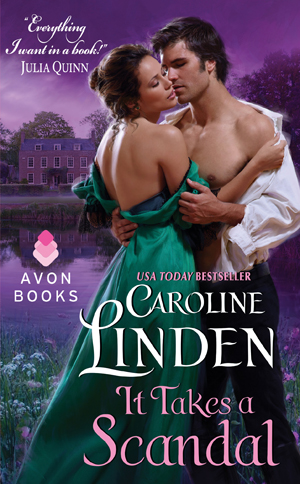


 1816
1816 The back of his neck prickled. Only one person in the house would do that … but Michael Vane was securely locked in his room upstairs. Sebastian did it himself, every night, for his father's own good.
The back of his neck prickled. Only one person in the house would do that … but Michael Vane was securely locked in his room upstairs. Sebastian did it himself, every night, for his father's own good.



